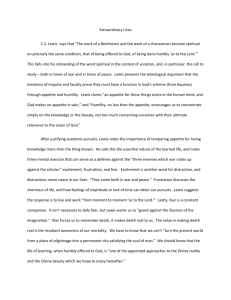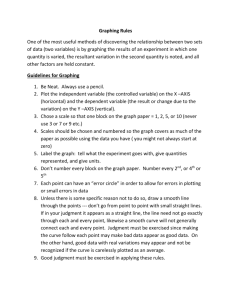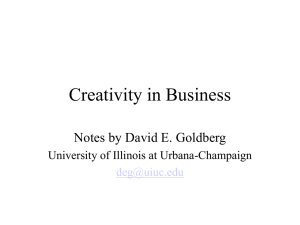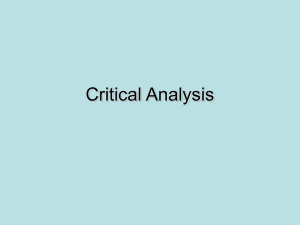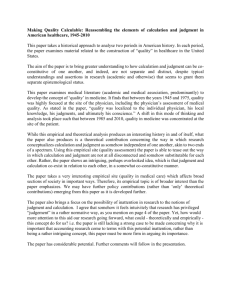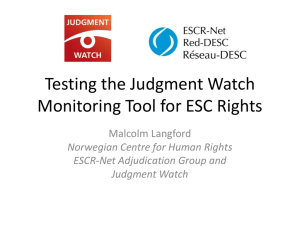20141110 Keohane TAL – Determining Leaders
advertisement
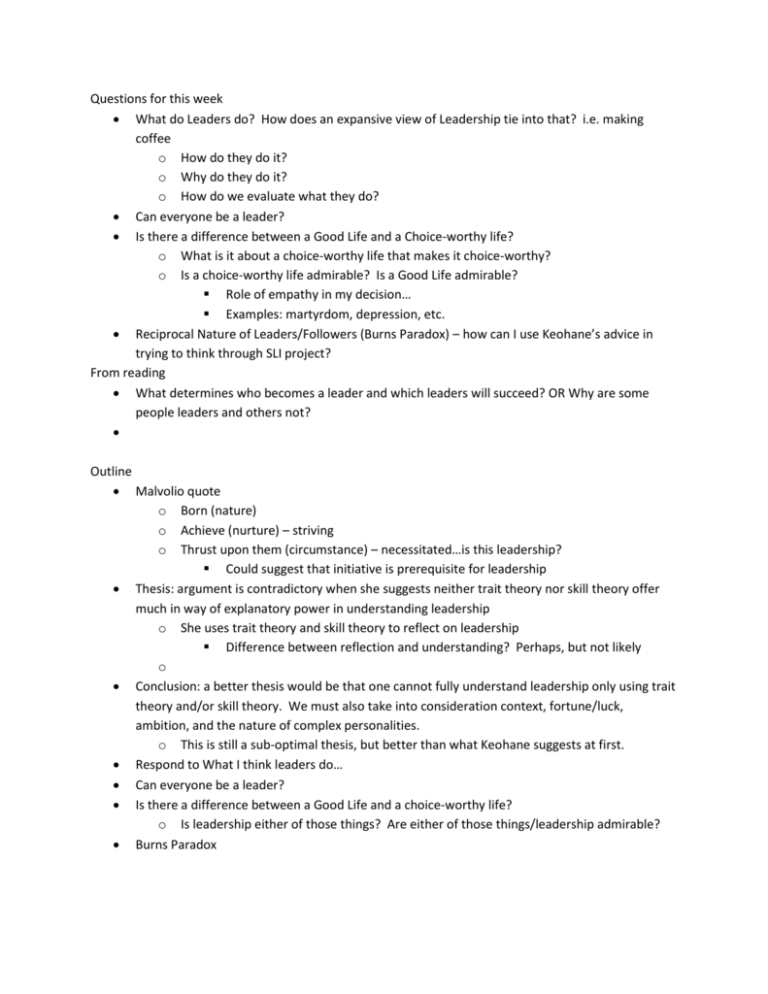
Questions for this week What do Leaders do? How does an expansive view of Leadership tie into that? i.e. making coffee o How do they do it? o Why do they do it? o How do we evaluate what they do? Can everyone be a leader? Is there a difference between a Good Life and a Choice-worthy life? o What is it about a choice-worthy life that makes it choice-worthy? o Is a choice-worthy life admirable? Is a Good Life admirable? Role of empathy in my decision… Examples: martyrdom, depression, etc. Reciprocal Nature of Leaders/Followers (Burns Paradox) – how can I use Keohane’s advice in trying to think through SLI project? From reading What determines who becomes a leader and which leaders will succeed? OR Why are some people leaders and others not? Outline Malvolio quote o Born (nature) o Achieve (nurture) – striving o Thrust upon them (circumstance) – necessitated…is this leadership? Could suggest that initiative is prerequisite for leadership Thesis: argument is contradictory when she suggests neither trait theory nor skill theory offer much in way of explanatory power in understanding leadership o She uses trait theory and skill theory to reflect on leadership Difference between reflection and understanding? Perhaps, but not likely o Conclusion: a better thesis would be that one cannot fully understand leadership only using trait theory and/or skill theory. We must also take into consideration context, fortune/luck, ambition, and the nature of complex personalities. o This is still a sub-optimal thesis, but better than what Keohane suggests at first. Respond to What I think leaders do… Can everyone be a leader? Is there a difference between a Good Life and a choice-worthy life? o Is leadership either of those things? Are either of those things/leadership admirable? Burns Paradox Keohane starts her chapter on the exclusivity of leadership (or “What Determines Who Becomes a Leader and Which Leaders Will Succeed) with an excerpt from Maria’s letter to Malvolio in Twelfth NightL “Some are born to leadership; some achieve leadership; others have leadership thrust upon them.” This is a very apt description, which Keohane defends, though her argument is somewhat contradictory when she suggests “Neither ‘trait theory’ nor ‘skill theory’ offers much in the way of explanatory power in understanding leadership.” A better thesis would be: “One cannot fully understand leadership only using ‘trait theory’ or ‘skill theory.’ We must also take into consideration context, fortune/luck, ambition (though this could still be considered a trait), and the nature of complex personalities (again).” Then perhaps use the frame of trait/skill theory to set the structure for the chapter (i.e. “However, because of their significance and utility, I will reflect on the nature of leadership through trait/skill theory as a learning tool or as a mechanism to further develop our understanding of an iconic/adaptive/optimal leader.” Keohane outlines several qualities that determine successful leadership, focusing on judgment, and progressing to also include getting and using information, rhetoric and communication, the power of symbols, decision-making, and the role of compromise. After that, she progresses to three pairs of “personal characteristics or traits that are often helpful for leaders…passion and proportion, empathy and detachment, courage and moderation.” She notes that they are often complementary despite their ostensibly dichotomic nature. I disagree with her characterization and treatment of vision as a quality of leadership, but appreciate her perspective on complex personalities and how personal characteristics can be aggrandizing as well as undermining. The importance of judgment, according to Keohane, cannot be overemphasized. She quotes Tichy and Bennis when they state: “The essence of leadership is judgment…Judgment is the core, the nucleus of leadership. With good judgment, little else matters. Without it, nothing else matters.” She elaborates to say that “good judgment becomes relevant when a leader clarifies goals, determines the best timing for pursuing an enterprise, develops a strategy for bringing together the energies of other people, and chooses partners in the effort.” Last week I tried to suggest a rather expansive view/definition of leadership, and if I were to continue holding that position, I would very likely agree that judgment is a categorical need and important quality of leadership. That being said, a criticism of any expansive definition is that, by its very nature, it becomes too inclusive. This criticism could be relevant in the case of judgment as well, because good judgment is not necessarily specific to leadership, but I would argue that good judgment is specific to success. Perhaps this raises a question of whether or not leaders need to be successful… Without taking time to explicitly define success more than that which is measured by end results, I would argue that leaders do not always have to be successful. Many times we appreciate the process of any endeavor as much, if not more than the end result. If we think about leadership in this way, we can appreciate leaders who fail as much or more often than they succeed. Perhaps there is something admirable or choice-worthy about those who lead lives setting goals that are impossible to attain, but through striving and failing for those goals, accomplish something significant and meaningful. Keohane suggests a Gladwellian understanding of making judgments as a process that “often involves reasoning, but there is an inner core of judgment that has more to do with a person’s innate reactions than with intellectual dexterity or anything that could be conveyed through teaching.” That being said, she does later note that judgment can be refined, honed, and improved by experience and reflection. She eventually defines judgment as “a distinctive mental capacity or skill, a way of approaching deliberation and decision making that combines experience, intuition, and intelligence.” In a way, this parallels the quote from Twelfth Night at the beginning of the chapter outlining the nature of leadership as that of the quality of being born (intelligence), achievement (intuition), and situation (experience). It is obviously not the same, but perhaps this suggests that Keohane is suggesting that judgment is an idealized state of continuous learning and application as the ideal or optimal style/quality of leadership. Keohnane’s skeptical treatment of vision as a quality of leadership is predicated upon what I consider to be an incorrect view of what constitutes a “vision.” Bennis states that “the first basic ingredient of leadership is a guiding vision. The leader has a clear idea of what he wants to do…and the strength to persist in the fact of setbacks, even failures.” Keohane notes several leaders that have had visions – and how it has been successful for them, but then turns to “successful leaders [who have not] come to power wit bold visions of this sort.” When she gives examples of leaders that have tried to shy away from “the vision thing” as described by George H.W. Bush, we actually find that those leaders do have visions. This is more of a comment on the nature of visions, and bold visions in particular. Keohane asserts: “In this case, as in so many others, the quality of the leader’s judgment – her sensitivity to the environment – will help determine when and how it is appropriate to present a bold new strategic ‘vision.’” I think that statement is quite telling and illustrates that KEohnane’s treatment of vision is altered by her focus on the importance of judgment as the quintessential and paramount quality of leadership. A vision for “implementation, discipline, and hard choices” as suggested by Lou Gerstner when taking over IBM is just as much of a vision as Gandhi’s self-governizing India. It may be less grand, but insofar as we understand leadership to be comprised of leaders and followers sharing a common goal, the iteration of that goal and helping people understand it – or motivating them to follow you, is part of leadership and can be described by vision. Lastly, I want to note that I was able to personally relate to Keohane’s perspective of complex personalities. *hypomania, examples in book, consider my virtues and flaws…
